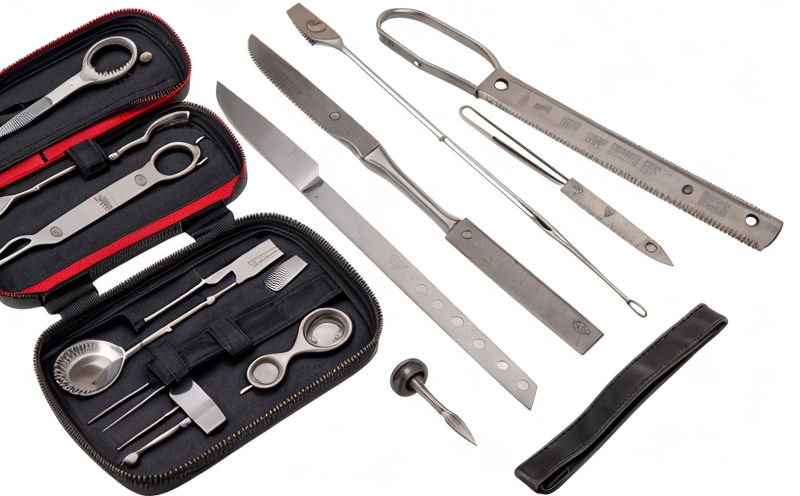Torque Resistance Testing of Surgical Screwdrivers
The torque resistance testing of surgical screwdrivers is a critical process ensuring the safety and effectiveness of medical devices used in surgeries. This test evaluates how much rotational force, or torque, can be applied to a screwdriver before it fails, either by slipping out of the screw head or breaking. The procedure is essential for verifying that surgical instruments meet regulatory standards and are fit for use in healthcare settings.
In the medical device industry, torque resistance testing plays a vital role in preventing complications during surgeries. By ensuring that the instruments can withstand the necessary torque without failure, this test helps maintain patient safety by reducing the risk of instrument slipping or breaking inside the body. This is particularly important given the precision required in surgical procedures.
The testing typically involves applying a calibrated torque to the screwdriver until it either slips out of the screw head or reaches its specified maximum torque value as defined by relevant standards such as ISO 14737 and ASTM F825-19. The specimen preparation for this test requires selecting appropriate screws that match the intended use, ensuring they are free from defects or contamination.
The apparatus used in this testing includes a universal testing machine equipped with an appropriate fixture capable of applying torque to the screwdriver. The machine should be calibrated according to ISO 8578:2009 and other relevant standards to ensure accurate measurements.
Acceptance criteria for this test vary depending on the specific surgical instrument being evaluated, but generally involve meeting or exceeding the specified maximum torque values outlined in applicable medical device regulations. Compliance with these criteria ensures that the screwdrivers are reliable and safe for use during surgeries.
| Surgical Instrument | Maximum Torque (N·m) | Acceptance Criteria |
|---|---|---|
| Screwdriver A | 2.5 N·m | Torque resistance of at least 80% of the maximum specified value. |
| Screwdriver B | 4.0 N·m | No failure during torque application up to the maximum specified value. |
| Screwdriver C | 3.0 N·m | Torque resistance of at least 95% of the maximum specified value. |
The testing process is highly standardized and requires meticulous attention to detail to ensure accurate results. It involves precise measurement and recording of torque values, analysis of any failures, and comparison against industry standards. Proper documentation of these tests is crucial for compliance with regulatory requirements and quality assurance.
In summary, torque resistance testing of surgical screwdrivers is a critical aspect of medical device manufacturing that ensures the safety and reliability of instruments used in surgeries. By adhering to established procedures and standards, manufacturers can produce high-quality products that meet stringent regulatory expectations.
Industry Applications
- Orthopedic surgery
- Cosmetic surgery
- Neurosurgery
- Gastrointestinal surgery
- Bone and joint repair
Torque resistance testing is particularly important in the following areas of medical device manufacturing:
- The development of new surgical instruments to ensure they meet the necessary torque requirements for various applications.
- Quality control during production processes, ensuring all surgical screwdrivers are within acceptable tolerance levels.
- Testing and validation of existing products before market release or updates.
This testing is crucial in these fields because it directly impacts patient safety by ensuring that the instruments used can withstand the necessary torque without failure. Proper torque resistance testing helps prevent complications such as instrument slipping during surgeries, which could lead to further injuries or prolonged recovery times for patients.
Eurolab Advantages
At Eurolab, we offer comprehensive torque resistance testing services tailored specifically to the needs of surgical instrument manufacturers. Our state-of-the-art facilities and experienced professionals ensure that every test is conducted with precision and accuracy.
- ISO 17025 accreditation for our laboratory
- Expertise in medical device testing
- Access to advanced testing equipment
- Dedicated team of engineers and technicians
We pride ourselves on providing reliable, consistent results that meet or exceed industry standards. Our services are designed to help you stay compliant with regulatory requirements while ensuring the highest quality of surgical instruments.
Why Choose This Test?
- Ensures patient safety by preventing instrument failure during surgeries.
- Aids in the development and validation of new surgical instruments.
- Helps maintain compliance with international standards like ISO 14737 and ASTM F825-19.
- Facilitates quality control throughout the manufacturing process.
Torque resistance testing is an essential component of ensuring that surgical tools are safe, reliable, and effective for use in various medical procedures. By choosing this test, you can help safeguard patient health while also meeting stringent regulatory requirements.





